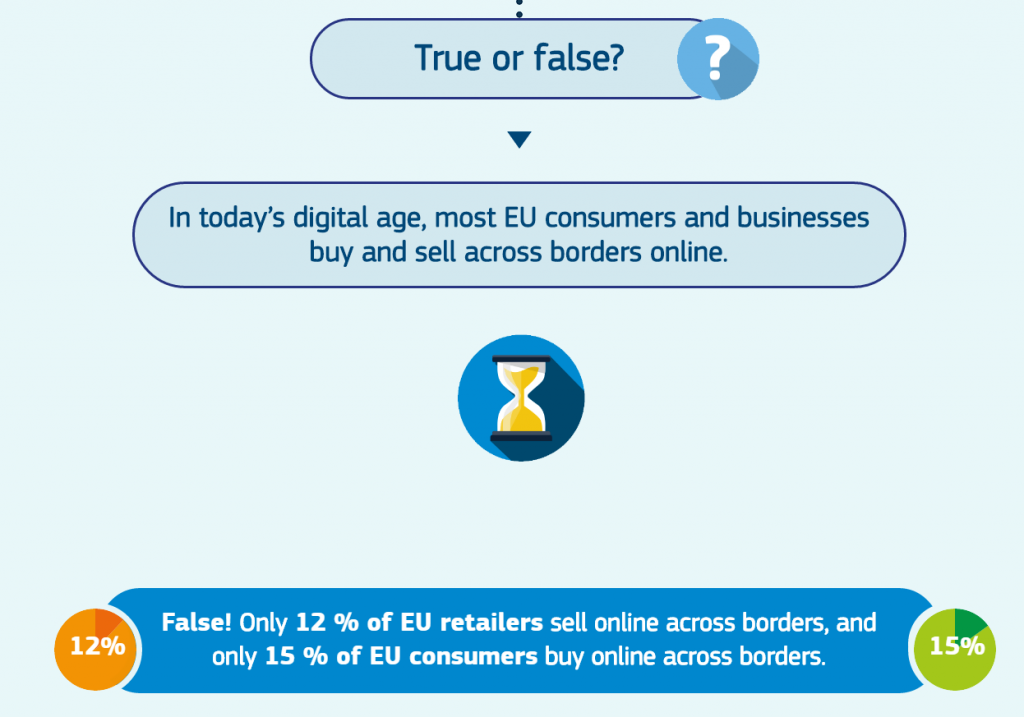With so much recent attention being paid to the U.K. for their vote to Brexit the EU, it’s easy to forget that the EU continues as one of the largest global markets. Unifying all the disparate nations of Europe into one seamless market is dizzying, but Europe has come a long way.
Tech is a major area where regulation often lags behind innovation. And selling online in Europe, believe it or not, remains a challenge for many EU businesses. So much so that the EU has begun to unify the rules across borders for online buying and selling. The European Commission created this interactive infographic to explain the problems limiting cross-border online selling in the EU and how they plan to address it.
We want to share how the European Commission sees the issue. But we also wish to note that before becoming law, these reforms are subject to major transformations and changes and are influenced by many stakeholders. What their final form will be is, at this point, a mystery.
The Problems
Selling across borders
Though they use a united currency and have comprehensive data protection rules, there are still significant barriers to selling across borders online in the EU. The numbers are shocking, showing that only 12 percent of EU retailers sell online across borders, and that only 15 percent of EU consumers buy online across borders.

Varying contract law
A major impediment to selling across borders is that companies are not familiar or certain about contract laws and consumer protection procedures in other markets. The time within which a customer must address a defect and the proper channels for making things right with a customer can all vary. In fact, it costs around €9,000 for a business to draft new contracts for just one additional EU country. The European Commission found that if these contract law barriers are lifted, more than 122,000 EU businesses would start selling online in other EU countries.
Consumer concerns
Businesses see added expenses and liability in selling online across borders. But consumers have concerns too. What if the item is not delivered or arrives damaged? What if the consumer needs a repair or replacement of a broken item? By addressing these concerns, the European Commission says, “the average sum spent by consumers each year in online cross-border shopping would increase nearly 14 percent.”
The Solution
The European Commission’s solution is to simplify contract rules so that customers and businesses alike will feel more secure and certain about doing business in every EU country.
For businesses
The first step is to make the EU regulatory environment more business friendly. Companies will benefit by avoiding additional legal costs when entering new markets, reducing outlay for adapting consumer contracts, and increasing legal certainty when engaging in cross-border trade online.
Businesses will then be able to reach far more customers, increasing their audience somewhere between 8-13 million new customers.

For consumers
Unifying contract regulations and cross-border selling rules means more certainty for consumers too. Unified rules for both physical and digital goods will relieve customers’ confusion when buying across borders. With digital products, this means knowing that if a product is defective, there is no time limit to the supplier’s liability. The burden is on the vendor of digital goods to prove you received your purchase. Long-term contracts can be ended with ease. Physical goods will have similar provisions to protect consumers.

Keystone
This infographic looks at these proposed changes, but the matter is far more complicated. Before any of these changes become law, it will be subject to massive revisions and reform. So while we cannot know exactly what the eventual reforms will looks like, the fact is that EU member states have no shortage of rules and regulations. The degree to which these rules are stifling online commerce has reached a breaking point. The European Commission’s move to simplify contract rules and make consumer protection universal across the EU will go a long way to unleashing subscription commerce across EU borders to the tune of billions of euros.
Click here to learn how to map and measure the subscriber journey.
Note: this post was edited for clarity. The information contained in the European Commission’s infographic pertain to proposed changes, not settled law. This post is not intended as advice or a legal opinion.